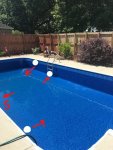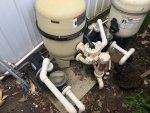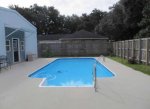So we have been losing about 2 inches of water with both the pumps running AND the pumps being turned off in a 24-hour period. It stops at the skimmer.
We plugged the skimmer hole up with a rubber expansion plug and lost no water. I'm assuming this means that there is a leak in the plumbing? We plan on digging on our own where we can access it to see if we can find the leak, but if we can't is our only option to call a leak detection company to pinpoint the leak and then remove concrete and plumbing?
Is there something we may have overlooked?
Vinyl pool, new liner April 2018. New filter July 2018. Pool is about 15 years old.
Thanks
We plugged the skimmer hole up with a rubber expansion plug and lost no water. I'm assuming this means that there is a leak in the plumbing? We plan on digging on our own where we can access it to see if we can find the leak, but if we can't is our only option to call a leak detection company to pinpoint the leak and then remove concrete and plumbing?
Is there something we may have overlooked?
Vinyl pool, new liner April 2018. New filter July 2018. Pool is about 15 years old.
Thanks




